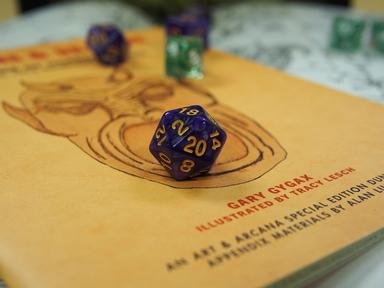Quiz Answer Key and Fun Facts
1. Let's start with the most iconic Wisdom-based class, the Cleric. Which of these would NOT be a requirement for a Cleric to be able to cast the Order's Wrath spell?
2. Considered by many the most powerful class available in the core D&D game, the Druid is also a divine spellcaster who can benefit from a high Wisdom. Which of these benefits does apply to a high level Druid with a Wisdom score of 21?
3. The Paladin class is one of the most demanding in terms of needing high attribute scores. You want a high Strength and Constitution to fight well and Charisma to improve various class abilities. A paladin however also benefits from high Wisdom in which way?
4. Let's move on to the "Oriental Adventures" setting. This setting does not know the Cleric or Druid classes but instead has a different divine spellcaster class somewhat resembling both. What is the name of this class?
5. First published in the "Miniatures Handbook" and then reprinted in "Complete Divine", the Favored Soul is a spontaneous divine caster which has several interesting facets. Which of these is NOT true about a Favored Soul?
6. You have both a high Strength and a high Wisdom (with no other exceptional scores), but do not want to play a class from the core rulebooks nor a divine caster. Which of the following classes would be a good choice to make use of these scores?
7. How would you like to steal from the gods and grant yourself 9th level spells as early as 14th character level? You can do so - provided you have a Wisdom score of 28 or higher and are evil. Which prestige class from "Complete Divine" can give you this power?
8. "Masters of the Wild" introduces a rather strange variant class for former Druids that have turned away from the path of nature. It gets abilities that are in many ways reminiscent of the Druid's, but rather have opposite effects, delighting in the destruction of nature. What is the name of this rather dark prestige class?
9. How about some powerful psionics? There is a Wisdom-based psionic class with a full power progression in the Ardent (from "Complete Psionic"). The key feature of this class is a domain-like system of choosing powers. What name is given to each such power group?
10. Hindrances and vows can make for interesting role-playing situations. The Apostle of Peace prestige class from "Book of Exalted Deeds" takes this to the extreme. Which of these is NOT a vow an Apostle of Peace must take?
Source: Author
WesleyCrusher
This quiz was reviewed by FunTrivia editor
ozzz2002 before going online.
Any errors found in FunTrivia content are routinely corrected through our feedback system.
